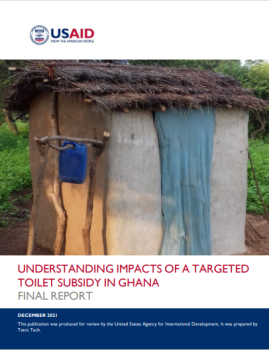The USAID Water, Sanitation, and Hygiene Partnerships and Learning for Sustainability (USAID/WASHPaLS) project partnered with the Government of Ghana-UNICEF sanitation program and two District Assemblies in the Northern Region (Tatale and Kpandai districts) to examine whether subsidies targeted at the poorest and most vulnerable community members may serve to improve the sustainability and equity of sanitation gains from Community-Led Total Sanitation (CLTS). Targeted subsidies are one component of UNICEF-Ghana’s sanitation-financing framework, which envisions a “Social Fund” to support toilet construction for the most vulnerable households. This research employed a cluster randomized controlled trial design in which 59 open defecation free (ODF)-declared communities were randomly assigned to the subsidy (treatment) group and 50 ODF communities to the control group, allowing for comparison of how the subsidy program impacted sanitation outcomes between the two groups. The study is presented in this report.


